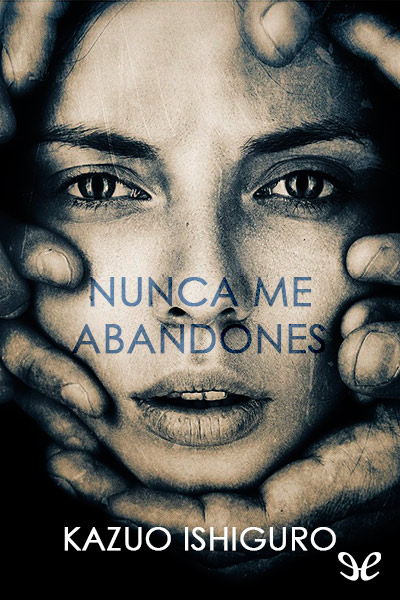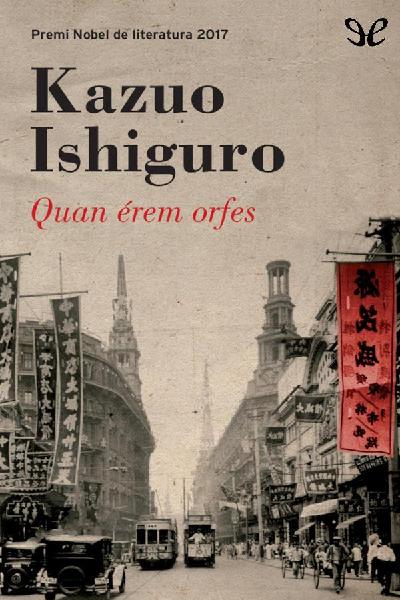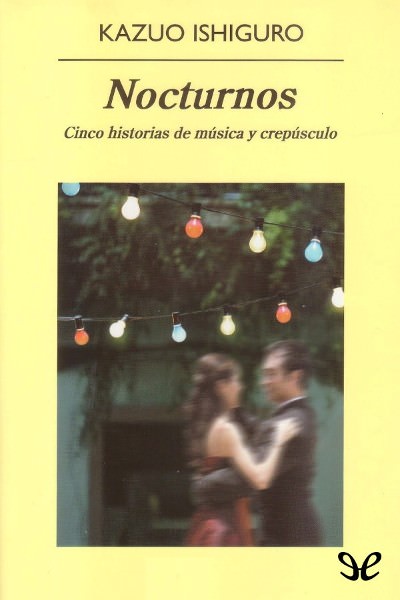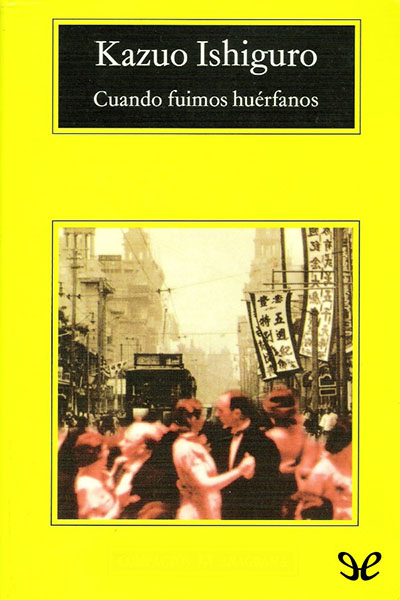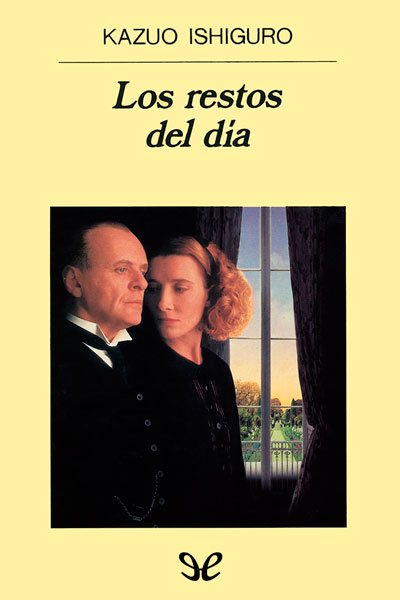oleebook.com
No em deixis mai de Kazuo Ishiguro
de Kazuo Ishiguro - GĂ©nero: Ciencia ficciĂłn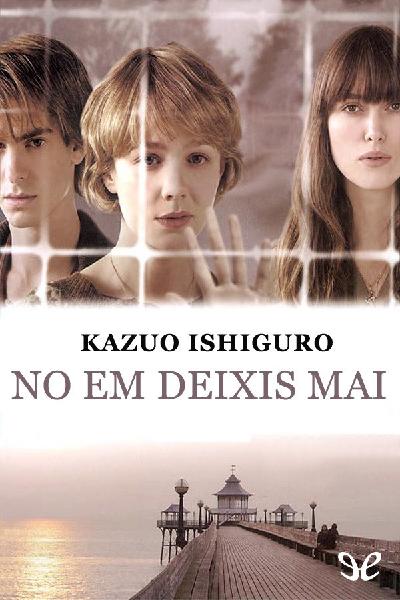
Sinopsis
La Kathy, la Ruth i en Tommy eren alumnes de Hailsham, una idĂl·lica instituciĂł docent situada en ple camp anglès. Els estudiants hi vivien escrupulosament protegits del mĂłn de fora, i seÂ’ls educava en el convenciment que eren especials, i que la seva integritat fĂsica era fonamental. Però, per què hi eren, en realitat?
Passaran molts anys abans que la Kathy, als seus trenta-un anys, es decideixi finalment a reviure el passat. El resultat és el captivador relat de com la Kathy, la Ruth i en Tommy, amants, amics i companys, van descobrint la veritat sobre la seva infà ncia aparentment feliç… i sobre el seu futur.
Una novel·la estranya, inquietant i commovedora que ens parla amb tristesa mesurada sobre les vides perdudes.
Descargar
Descargar No em deixis mai ePub GratisLibros Recomendados - Relacionados
Reseñas Varias sobre este libro
Let me start by saying that my review might contain some plot spoilers. However I personally don't think that knowing the plot in advance will in any way diminish the enjoyment of this story. The beauty of this book is not in the plot, but in its execution.
Another friendly warning: Never Let Me Go is for some reason often classified as science fiction. This is why so many readers end up disappointed I think. This novel is literary fiction at its finest. So if you look down on literary fiction and consider books written by authors Ian McEwan, Margaret Atwood, and Jose Saramago pretentious, this is not a story for you.
Now to the novel itself. Kathy, now 31, is a former student of an English boarding school Hailsham. Hailsham is a school for kids with special purpose. All education in this school is geared towards conditioning its student to accept their "special" destiny as a given. As Kathy is getting ready to make her first donation while being a carer for other donors, she recounts her life in Hailsham and on her own, mostly in a form of anecdotes about herself and her best friends Ruth and Tommy, their rivalries, jealousies, and affection for each other. There is nothing particularly shocking, gruesome, or intense about Kathy's story, and yet it leaves you with a sense of being a part of a nightmare.
After reading quite a few of the book, I can say that I loved the aspects of it that many abhorred. What other readers say about Kathy - her detachment, her lack of fire and rebellion, about broke my heart. What can be more heartbreaking than witnessing human lives wasted? Let me tell you - witnessing lives taken away from people who do not even realize what is being taken away from them, people who do not understand the value of their existence, people who do not know they have a right for more.
There is of course, much more to the story. The novel explores the futility of human life, its un-bargainable eventual "completion" and how we all choose to deal with the inevitable end. But for me personally the pain of Kathy's quiet resignation to her fate was what stood out and touched me the most.
In many ways Never Let Me Go reminded me of The Handmaid's Tale by Margaret Atwood. Only Kathy is a step further from Offred. If Offred knows what horrors she is subjected to, but has no strength or will to change her circumstances, Kathy doesn't even know that her life "purpose," her destiny is inhumane. This work is also, to me, very reminiscent of Ian McEwan's Atonement. McEwan is a master of subtle build-up to an almost unbearable, life-shattering moment, but Ishiguro is a master of subtle telling without telling, foreshadowing, and emphasizing the gravity of the unsaid.
What else can I say about this novel? Never Let Me Go is a masterfully written work of fiction which raises questions of what it is to be human, what you choose to do in the face of an impending death and what happens when science is not accompanied by ethics. Subtle, eerie, chilling, and poignant. One of the best books I have read this year.1001 2010 contemporary ...more1,075 s3 comments Trevor1,345 22.8k
It is a pity that people are told this is a science fiction book before they read it. I feel the least interesting thing about it is that it is science fiction. I mean this in much the same way that the least interesting thing one could say about 1984 is that it is science fiction. As a piece of literature I enjoyed it much more than Margaret Atwood's Oryx and Crake and even more than Huxley's Brave New World.
The themes that make this book most interesting are to do with the social alienation of groups of people on the basis of inherited genetic characteristics. In fact, as a critique of racism this book is utterly brilliant. Those being racially alienated are genetically identical (they are in fact clones) to those attacking them.
Plato believed those 'in the know' should tell lies to those 'who do not know' so as to protect them from the all too horrible truths about life. I have always hated this aspect of Plato, always finding it grotesque and frightening in its implications. Those implications are drawn out in all their disturbing horror here.
This book has much to say about the nature of 'illness' and how those inflicted with an 'illness' use the scars of that illness as the badges of truly belonging to the group. So that those 'less advanced' in the ravages of the illness don't really know or really belong to the group. As a portrait of victims adopting to being victims it says much about us as humans - thoughtful readers may find it says far too much. I write this on World Aids Day.
Ishiguro writes the most nightmarish novels I've ever read. In others, such as The Unconsoled or When We Were Orphans the nightmare feeling is due to the dream oddity of the interconnection of events in the story. One reads these books in much the same way that one wakes from a disturbing dream, with feelings of disorientation and anxiety. Even though this is the most literal 'nightmare book' of his I have read - the world he creates being literally a nightmare, and made all the worse by being set in the recent past - it is a book totally lacking in that strange dream quality so characteristic of these other novels. In this sense it seemed less of a nightmare than these others. If you struggled with these, you will not struggle with this in quite the same way.
He also has fascinating and quite painful things to say about the nature of love and how love has a proper time, a time that may be lost or missed. As someone who has loved, lost and missed I found this particularly challenging. The relationship between sex and love and illness is perhaps something people may find simply too much - not because this is handled in any way that is too explicit, but because I do believe we to think that sex, as a manifestation of love, has curative and redemptive powers. A book that questions this, questions something we hold very dear and some readers may find this too much to ask.
This is also a book about betrayal. The betrayals we commit against those we love the most and yet that we barely can understand or explain after we have committed them - these are constant throughout the book. He is a writer all too aware of the human condition. The scene which gives the book its title is a wonderful example of the near impossibility of our being understood by others and yet our endless desire for just such an understanding.
There is nothing easy about reading this book - although it is written in the simplest of prose. It has an honesty of feeling that brands one's soul.
I loved this book and have thought about it a lot since I finished reading it and will think about it more. There is much more I would to say, but there is no space. May we all be good carers before we complete.literature2,937 s4 comments Madeline781 47.8k
You know those random stock characters in sci-fi/action movies, the ones who never get names or any lines? They're always spending their precious few minutes of screen time getting shoved out of the way as the hero hurtles desperately down a hallway, or watching from a safe distance as a climactic fight goes on, or diving out of the way whenever a murderous cyborg smashes through their office window. Have you ever wondered what those people's lives were ? Have you ever thought to yourself, "Man, this movie's interesting and all, but I want to know more about that guy who owned the hotel where Sarah Conner hid from the Terminator. I bet he leads a fascinating life." (believe me, he doesn't.)
Imagine if someone decided to write a book about this kind of person. The result is Never Let Me Go.
(semi-spoilers ahoy, you've been warned) So the book is about a sort of alternate-universe England, where people are cloned and the resulting kids are raised in isolated boarding schools, spending all their time painting and playing sports and getting vague hints about how when they get older they'll have to make "donations." We learn (eventually and with no drama whatsoever) that these kids were created specifically as future organ donors, and that's all they're meant for. Ishiguro introduces us to Kathy, the narrator, and her friends who lived at one of these schools with her - Ruth and Tommy. As I said, we gradually and laboriously learn about the school's real purpose, but it seems almost a subplot, because the majority of the book is just Kathy nattering on about her school and how she and Ruth got into a fight this one time and also she had a crush on Tommy but he and Ruth were dating so Kathy had sex with some other random guys and oh my god can we get back to the organ donor thing? Seriously the whole book is that - we get the sense that there's some creepy futuristic stuff going on in the background, but our protagonists don't care because they're too busy telling us about that one time Kathy lost her favorite cassette tape and it was very upsetting.
Even when it seems a plot's about to start, it's always a false alarm. The trip to a nearby town that the three characters take to find a woman they think may be Ruth's "possible" (a person she may have been cloned from) doesn't pan out, and we realize that the real point of the trip was an attempt to convince the reader that Tommy and Kathy have some sort of romantic attraction to each other. Ruth's possible, and everything it might have meant, is abandoned so that Ishiguro can have another chance to demonstrate his astonishing inability to create any kind of chemistry between two characters.
And the end. Without giving anything away, I'll just say that Kathy and Tommy finally get all the answers about their school and what was actually going on, and they respond by...going about their lives in the exact same way as before.
I mean, good God. Even though this is supposed to be some sort of more intellectual science fiction, I don't care. There's cloning and dystopian undertones; ergo it is sci-fi. And I my sci-fi loud, shiny, and dramatic, with lots of explosions and computers that talk.
There's a reason Harry Potter starts when he gets his Hogwarts letter, folks. Because no one wants to hear about ordinary people being ordinary - that's kind of the whole point of fiction.This entire review has been hidden because of spoilers.Show full reviewscience-fiction the-list ugh1,291 s28 comments Michelle68 37
I can see Never Let Me Go being great for book clubs because it will generate a lot of discussion.
That being said, I didn't care for the book, for a couple of different reasons. The writing style is very conversational -- very much you're having a discussion with the protagonist. The thing that annoyed me the most about this was the fact that the things that happened (so bob and I went walking to the store and we had a fight about the tree at school) and then the writer would tell you about the tree and why it was significant, then tell you about the fight. This sort of device is interesting the first few times you see it, but it started to annoy me over time. Maybe because I talk that, and get off into tangents and anecdotes.
Also, at the heart of the store is the purpose/fate of the main characters. I get the impression that the author wanted to drop clues about it, and then reveal it so that it is a shocking twist (who's Kaiser Soeze? ;) The thing is, the references really aren't that subtle, so by the time the twist is reavealed, it's not all that exciting. Not only that, but I had so many questions at the end. -- these people know their fate, but they never think to question it, and, in fact, seem to be glad for it.
This was supposed to be a coming of age story. Generally "coming of age" involves people growing up and moving forward with their lives; often they need to overcome some obstacle to reveal their potential. However, the characters seem to be stagnate the whole way through; their fate doesn't change. The blurb on the back of the book mentions that the characters, Kathy, Ruth and Tommy, all have a shared background that's special, and implies that they're lucky. When two of the charaters confront someone to see if they can defer their fate (they don't even bother trying to change it), we find out a little bit of what makes their shared background special, but we aren't given anything to compare it to (we're just told that similar people have horrible existences, but not how). And they find out that they can't defer their fate, but they don't really seem to care; they don't even seem to be particularly glad that they tried.
I've seen a couple of compare this to book to Aldous Huxley's classic "Brave New World" and Margaret Atwood's "The Handmaid's Tale". Not even close. In both of these books we're exposed to an alternate reality, and we see how the main characters deal with their situations. Kazuo Ishiguro tries to sneak the alternate reality into the story, to take us by surprise.
I could go on, but I won't. Let's just say that I didn't care for this book and leave it at that.This entire review has been hidden because of spoilers.Show full reviewread-in-20071,712 s Fabian977 1,923
Ah f**kin' British writers! My inclination to adore everyone from Evelyn Waugh to Charles Dickens, from Alex Garland to Zadie Smith seems very ingrained (VERY DEEP) inside me, primordial, & there must be SOME bloody reason why I find most English fiction so alluring. I think it has mostly to do with mood. It may linger deliciously...
The best book I've read all year (though not including Graham Greene's "The Quiet American") is about a microsociety of students in a boarding school hybrid named Hailsham. While there they do rounds and rounds of arts and crafts and come of age together, grow up, & yet there is something so not right with their seclusion and it takes page upon page to discover why it is that they are there. It is horrific, it is bizarre, this secret is handled with so much craft that it is indeed this attribute that marks this outstanding (quite brutal) masterpiece apart from all others.
There is an incredibly subtle mastery of several different genres here. Sci-fi meshes impeccably with allegory which is played out in the manner of a Gothic romance. Because the characters are trapped in all of this, the end result is (The Genre Supreme:) Tragedy. I feel so bad for Ruth, Tommy & especially for Kath, the wise but all-too-frail narrator, but at least their petition, which is the book's title, is true. This one is now on the list of all those I cannot let go or do without.favorites730 s Shannon 1,216 2,347
It's very important, if you're intending to read this book, that you don't read any or listen to any talk about it first. I had no idea what this book was about before I read it - and the blurb gives you a very different impression, actually - and so I slipped easily into a story that was as engrossing as it was revealing.
If you know something about what to expect, though, I don't think you'll enjoy it nearly as much. It's a bit an art installation that requires audience participation: you have to do your bit, too, to make it work, so it makes sense, so it tells the story it was meant to tell. Keep yourself in the dark, that's my advice. Because of this, there's no point in writing an actual review.2008 alternate-history book-club ...more1,576 s2 comments Hannah Azerang140 108k
this book was not AT ALL what i expected.
from a writing standpoint, this is easily 5 stars. but overall, the story left something to be desired. i also didnÂ’t find this to be as devastating as most people say it is. itÂ’s objectively a sad story, but to me it was more disturbing than anything else.
no one who recommends this book ever says what itÂ’s actually about (also i rarely read synopses), so i had no idea that this is speculative fiction and not literary fiction. so to say that i was shocked when i got to some of the more sci-fi elements would be an understatement loll 776 s6 comments Ian "Marvin" Graye907 2,427
DIALOGUE:
Imagine a restaurant, London, mid-2003.
Publisher: Hey, K, we need another novel and we need it quick.
K: I know, I know.
Publisher: Another “Remains of the Day”. Something Hollywood can turn into a hit.
K: IÂ’m working on it.
Publisher: Any ideas?
K: Well, IÂ’ve been reading some Jonathan Swift.
Publisher: Who?
K: You know, “Gulliver’s Travels”.
Publisher: Oh, yeah, Jack Black. It's in pre-production.
K: Well, he had a modest proposal about how to stop the children of the poor being a burdenÂ…
Publisher: IÂ’m with you, yep, delinquents, sounds good.
K: Â…he wanted to stop them being a burden to their parentsÂ…
Publisher: Yep, with you.
K: Â… and the Country.
Publisher: Yep, a Thatcherite angle, I think itÂ’s MaggieÂ’s time again.
K: Anyway, he had this idea that you could kill two birds with one stoneÂ…you could end the kidsÂ’ misery and the poverty of their parents at the same timeÂ…
Publisher: Let me guess, you could eat them, ha ha.
K: YouÂ’ve read it?
Publisher: NoÂ… wait, youÂ’re kidding me, arenÂ’t you?
K: No, thatÂ’s the whole point of the story.
Publisher: What, eat your kids?
K: No, not your own kids, other peopleÂ’s kids.
Publisher: How could anyone do it?
K: He goes into thatÂ… stewed, roasted, baked, or boiledÂ…
Publisher: Yuck.
K: He even talks about making them into a fricassee or a ragout.
Publisher: ItÂ’s a bit out there, K.
K: I was thinking of updating it a bit.
Publisher: How would you do that?
K: I was thinking I could tell the story from the point of view of a midwife whoÂ…
Publisher: Someone who has to care for the kids?
K: Yeah, until they turn 12 months or something...
Publisher: Let me guess, then she hands them over to a child butcher or something?
K: Yeah.
Publisher: Look, I can see where youÂ’re going with this, but it all sounds a bit grotesque.
K: ThatÂ’s the whole point. ItÂ’s an allegory for our times.
Publisher: I just donÂ’t know whether itÂ’s got legs.
K: Legs? YouÂ’re kidding meÂ…itÂ’s got every damned limb and organ you can think of.
Publisher: I don’t want to think of it, I can just imagine the . They’ll call it “The Remains of the Meat Tray”.
K: Ha, I hadn’t thought of that, I was going to call it “The Remains of the Creche”.
Publisher: It gets worse.
K: No, honestly, I was thinking of “Never Let Me Grow”.
Publisher: You mean, Â…never let me grow up?
K: Yeah.
Publisher: Do you think you could turn the people into pigs or something, you know, “Animal Farm”?
K: I was sort of hooked on the idea of using people and narrating the story in a really dead pan voiceÂ…
Publisher: I donÂ’t know about dead pan, it sounds more frying pan to me.
K: Â…If itÂ’s dead pan, people wonÂ’t be able to tell whether itÂ’s set in the future or the present. They wonÂ’t know how close to reality it is.
Publisher: I just donÂ’t know what I think about this eating babies stuff.
K: But itÂ’s sci-fi, you can do anything in sci-fi.
Publisher: Look, if we let you do this, they wonÂ’t be calling it sci-fi, theyÂ’ll be calling it sci-fry.
K: If you let me do it, I guarantee weÂ’ll be able to get Helen Mirren to play the midwife.
Publisher: Who?
K: Helen Mirren, you know, the Queen.
Publisher: No, no. Look, if you can tweak it, you know, think about my idea for a second, set it on Animal Farm, make it about cloning pigs, so they can grow body parts for other pigs or somethingÂ…
K: I know, put some wizard animals in it and call it “Hogparts”?
Publisher: Come on take me seriously, K, just clone it up and tone it down.
K: IÂ’ll think about it.
Publisher: IÂ’ll see if I can get Keira Knightley to voice one of the pigs.
K: SheÂ’s hot.
Publisher: You could call it “Never Let Me Go”.
K: What does that mean?
Publisher: ItÂ’s a song my mother used to play. Jane Monheit sang it.
K: I could get used to it. DonÂ’t know what I think about the name Monheit though.
Publisher: It does sound a bit German, doesn't it?
K: What would you think if I called her something more English in the book.
Publisher: Judy Bridgewater?
K: WhoÂ’s Judy Bridgewater?
Publisher: ItÂ’s my motherÂ’s maiden name.
K: Sounds good to me.
Publisher: Look, I normally to respect an artistÂ’s integrity, but hey, youÂ’re the artist, so I guess that makes it OK.
K: Do you think I could get to meet Keira Knightley?
Publisher: I think soÂ… look IÂ’ve been thinking about it, maybe itÂ’s not such a good idea to turn Keira Knightley into a pig.
K: Sometimes you canÂ’t really see the depth of your own characters, until you can imagine whoÂ’s going to play them.
Publisher: So, no pigs?
K: No pigs. I donÂ’t mind the cloning bit though.
Original Review: April 16, 2011
CRITIQUE:
Some More Serious Thoughts
I wrote the above dialogue before I even finished the book.
I wanted to read the book before seeing the film, which I will probably do in the next week or so during the holidays.
When I wrote the dialogue, I probably had about 50 pages to finish, but the dialogue had taken shape in my head, and I didn't want to risk losing it.
There might have been a chance that it would be superseded by my final thoughts on the novel itself.
I had high expectations that I would finally get to appreciate the novel more when I had finished it and absorbed the denouement.
Unfortunately, it left me feeling dissatisfied.
Narrative Style
I didn't find the narrative style appropriate or convincing.
It is told in the first person, by way of recollection of three different periods of Kathy's life.
The periods are discussed chronologically, although during each period, there are occasional allusions to each other period.
There is a lot of internal detail about each period, what was going on in Kathy's head.
Dialogue between the characters is infrequent and sparse.
The novel is overwhelmingly an interior monologue.
Occasionally, there are lapses or flaws in Kathy's memory that she self-consciously draws attention to.
Part of me wanted to say to the author, "It's your story, just get it right, you can remember anything you , because you're making it up anyway."
But then I guess we have to differentiate between Ishiguro and Kathy.
We have to expect some flaws in the glass, rather than a word and memory perfect narrative.
Still I was never really confident who Kathy was talking to, it wasn't just an interior monologue, there were occasional mentions of a "you", a second person to whom she was talking.
If you had sat down to tell this story to someone else, I think you could or would have told the story far more succinctly and selectively.
The detail and the repetition of environment, atmosphere and mood bulk up the painting, but they don't add to the depth.
Each new layer of paint is superimposed on the previous layer, so that while there might be a lot of paint on the canvas, it is physically, rather then metaphorically, deep.
The Geometry of Love
SPOILER ALERT
While Kathy, Ruth and Tommy live in an horrific environment (perhaps a metaphorical equivalent to a concentration camp), the novel deals with the quality of their humanity under these circumstances.
The guardians might have been trying to work out (incidentally) whether they had souls, but ultimately what we learn is that the positive aspects of human nature can survive or prevail despite the circumstances.
It's interesting that the characters' quest for love initially seemed to be motivated by a belief that it would postpone their donations and prolong their lives.
While this belief turns out to be mistaken, Kathy discovers that love is worth seeking in its own right, regardless of any consequences or notions of cause and effect.
Ruth promoted the belief in the life prolonging effect of love.
In effect, Kathy acquiesced in it and never deliberately interfered in or disrupted the relationship between Ruth and Tommy.
However, when she comes to the end of the story, perhaps she realises that she should have been less acquiescent and let herself express her love for Tommy.
So ultimately, "Never Let Me Go" is a love story, a triangular one at that.
Life is short, you just have to get on with it, you have to take your (true?) love wherever you can find it, even if someone else gets hurt in the process.
When we pair up in love, there is always a chance that someone will miss out or get hurt.
Three into two won't go.
Perhaps, this is actually calculus rather than geometry, but you know what I mean.ishiguro read-2011 537 s Jim Fonseca1,121 7,545
I had this book on my TBR shelf for years without realizing that it was essentially dystopian science fiction.
The main character is a woman in her early thirties reflecting back on her life as a child at a private school in England. Kids in the school grew up in an isolated but almost idyllic setting; not knowing their parents but realizing somehow they were “special.” After finishing school they live together in small groups in cottages before heading out into the world on their own. The story is set in the late 1990s.
From the very first page we learn something is not right just from the language. We read that they have become “carers” and “donors;” their teachers are called “guardians” and they know there are people out there called their “possible.” We also learn they can have sex but are incapable of having children and that after their third of fourth “donation” they have “completed.” So we catch on pretty quickly what life has in store for these kids.
There are some genuine mysteries though. Why does the school seem obsessed with encouraging them to do creative work, giving them awards and collecting the best work to go to a gallery that they never see? Where does it go and who sees it and why?
Much of the plot is built around a three-way love story between a boy and two girls at school. One of the girls is the main character. All three are good friends but the boy and one of the girls are a couple. The girl in the couple is controlling and domineering and prevents the relationship between her boyfriend and the other girl from developing. Later in life a romantic relationship develops between the other girl (the young woman who is our main character) and the now-young man. In fact she becomes his “carer.” Is the love they develop better than it would have been years ago? Or is it too late and stale?
This quote tells us about the title: “Because maybe, in a way, we didn’t leave it [the school] behind nearly as much as we might once have thought. Because somewhere underneath, a part of us stayed that: fearful of the world around us, and – no matter how much we despised ourselves for it – unable quite to let each other go.”
I thought it was a good story; it kept my attention all the way through, although not quite as good as the authorÂ’s best-known work, Remains of the Day.
Top photo from englishcottagevacation.com
The author from newyorker.com
[Revised, pictures added, spoiler hidden 12/31/22]
british-authors dystopian science-fiction511 s Scarlet190 1,251
Despair. That's what I felt after reading this book. The kind of despair that suffocates you, that makes you want to break things, or, at the very least, go out for a run so you can let out the agony bubbling inside you.
It's ironic, but Never Let Me Go is about three friends who are destined to let go of everything - their bodies, their dreams, their lives and the people they love. And there's NOTHING they can do to avoid that fate.
I hate what this book did to me. I hate the author for creating a semblance of hope, only to completely crush it later.
And that means I hate this book for all the right reasons.
“I keep thinking about this river somewhere, with the water moving really fast. And these two people in the water, trying to hold onto each other, holding on as hard as they can, but in the end it's just too much. The current's too strong. They've got to let go, drift apart. That's how it is with us. It's a shame, Kath, because we've loved each other all our lives. But in the end, we can't stay together forever.”booker-prize books-i-own classics ...more479 s1 comment emma2,113 67k
I just...don't know how you take a book with a plotline as interesting and creepy and unique as this one and turn it into an unrelenting snoozefest, party of one.
When I hear "the best novel of the decade," I expect brilliance.
When I hear "now a major motion picture starring Carey Mulligan, Andrew Garfield, and Keira Knightley," I expect excitement.
When I hear "millions of copies sold, presumably, based on the number of Goodreads ratings there are," I expect memorable characters or writing or storytelling or SOMETHING.
But I got nothing.
I've put off writing this review for a month, which is kind of but not super unusual for me admittedly, because I do not remember a thing about it.
And not really because I have forgotten the whole thing, but more because...well, what's to remember?
Bottom line: If anyone is looking for a nice little one way getaway to snoozeville, I have the book for you!
------------
pre-review
yes, the ending of this made me sad, but at the same time and in a much more pressing way this is maybe one of the most boring books i've ever read.
review to come / 2ish stars
------------
tbr review
i will read:
1) every book that is called the best of the decade
2) every book that was then adapted into a movie starring carey mulligan OR keira knightley OR andrew garfield that i can watch.
so basically i'm reading this 4 times over.2-stars authors-of-color eh ...more432 s19 comments Sean Barrs 1,122 46.6k
The thing I enjoy most about IshiguroÂ’s writing is the sheer level of depth he gets into his characters; he captures all the intensity of real emotions whether they are self-serving or destructive. His writing style is simple, plain even, but he builds up many layers within his storytelling to unleash the full symphony of conflicted feelings in powerful bursts.
However, I saw none of his brilliance here.
Indeed, for all his talent, I donÂ’t think this novel was as effective as The Remains of the Day or even When We Were Orphans. For me. this is a lesser novel by a great writer.
This is his most popular work, and his most critically acclaimed, and I think that’s only because of the particular themes he explores here. This is science-fiction, but I prefer the term pseudo-science fiction. It’s slightly futuristic, but the fictional elements are relatively comparable to what man can do today. Vivisection transplant is nothing new. Organ donors are nothing new. This book is very similar to the movie “The Island” (2005) where a select group of people have special clones bred for the singular purpose of providing them with replacement body parts.
What I find interesting is how these two were released so close together. For me, such forms of artifice reflect the worries and concerns of that decade. Discussions over designer babies and animal rights issues (in regards to testing, transplants and cloning) were often in the media. If we look back to the Victorians, the elements in the literature reflected the concerns of the age. This is true for all literary movements; I just used this one for an example, but the point is I think this novel reflects an aspect of the time in which it was written. And for me thatÂ’s why I think itÂ’s worthy of study, it's timely.
But did I enjoy it?
Not overly. Do I think it is a success artistically and dramatically? Not really. For me the novel continuously fails to deliver. The retrospective narrative remains detached from the happenings. Granted, the voice has lost all sense of hope and is looking back at a life of sorrow and incompleteness, but it just didnÂ’t have a sense of life. You could say thatÂ’s because she is semi-human in the state imposed on her, but, for me, it was too despairing. And thatÂ’s coming from someone who counts Edgar Allan Poe amongst his favourite authors.
The inability of the characters to question the situation also somewhat puzzled me. Surely, they must have had some glimpses of thought that considered their present situation an injustice? There was a lack of inquisitiveness into the morality of the situation. And this, when paired with their complete failure of recognising their own feelings about each other, made the narrative feel slightly incomplete. They didnÂ’t seem to look beyond their own situation. As a reader, we make our own judgement calls, but where were theirs? A certain emotional immaturity, that bordered on the absurd, ran through the work.
Overall, I can see why this book is so popular. But I donÂ’t think itÂ’s all that. IshiguroÂ’s other books are much more accomplished.
Facebook| Twitter| Insta| Academia2-star-reads contemporary-lit sci-fi425 s1 comment Seth T.Author 2 books908
I'm always excited when I run across a novel that is, so far as I can tell, essentially perfect. Never Let Me Go is one of those. There is not a single thing wrong with this book. Ishiguro is a master craftsman and it shows here.
The novel's characterizations are pitch perfect. Its narrative flow reveals things in exactly the right order. Mystery is preserved until it no longer matters and then, under the light of revelation, we discover the mystery was never the thing that mattered. Ishiguro plays with the reader as he unfolds his exploration of what it means to live—but never does so unfairly or at the expense of his characters' right to dignity and reality (a right that he very much does grant his characters).
Never Let Me Go is narrated from nearly a decade before its publication. As Kathy quietly reminisces from her vantage in the late 1990s, she gradually comes to explore a life fraught with meaning and purpose—and fraught simultaneously with that kind of superlative meaninglessness that Ecclesiastes bemoans in all of its somber weariness. Kathy is a caregiver to recuperating donors and relates her special pleasure in the few instances in which she had been able to offer care to those who had been students at the exclusive (and, as it turns out, much envied) Hailsham, where she herself grew up. Memories of Hailsham water a fertile delta of memories through which we gradually come to understand both Kathy and the world she has inherited—a world filled both with much light and much darkness.
In other words, a world much mine or yours. Still, Kathy's story is unique and it is in her own tale's peculiarities that our own is better revealed. Better explored.
Some may be tempted to see Never Let Me Go as ethical question and admonishment to this generation of readers and to the one that follows us. Certainly, that is there, but only as mise-en-scène to the larger panorama of a woman's quest to discern her past, present, and future from a glut of memories (some of which are only mostly trustworthy or even trusted) and how that journey sheds light on questions more important than mere ethical concerns. In Never Let Me Go, Ishiguro continues to play as he has in past works with memory and perception and how memory is so often the primary defense against perspicacity, yet as his narrator is acutely aware of her own remolding of history through nostalgia and forgetfulness, we are assured that perspicuity is not his target here.
No. I believe Never Let Me Go is much more a perfectly plotted meditation (and its style is itself quite meditative) on the human condition, the place of our own hands in shaping our destinies, and what it means to live. These could all be clichéd topics but Ishiguro approaches with such a vaguely detached sublimity that he breathes (through Kathy his narrator) a certain verdant spirit into these things. They are never treated as anything more than mundane, but it is precisely by that treatment that he gives his purpose such power and impact.bookclub321 s zuza_zaksiazkowane435 39.4k
2.5fiction in-my-home-library316 s Esteban del Mal191 63
I had previously avoided this book, having heard it referred to as British science fiction. And when I hear "British science fiction," I think of Dr. Who. Then I think about all those childhood snuff film fantasies where Captain Kirk zaps him. (Phasers set to kill, dammit! Inter-dimensional traveling dandies in phone booths are the exception to Federation regulations. What is it about the British, anyway? A phone booth? That's Superman's bag, baby. Superhero envy much? The sun may have never set on the British Empire, but we Yankees have a guy who can fly faster than the speed of light.) But then I found myself alone in a big bookstore in a big city trying to divine what the angelic face on the book's cover was looking askance at (itself manipulated, no doubt, the fictional clones whose story it was fashioned to sell) and thinking of Kurosawa's definition of art being about the ability to look at humanity in its entirety without flinching.
Mulligan. I flinched.
But Kazuo Ishiguro hasn't. And he doesn't think much of me. Or you. And he's probably correct in that judgment.
Imagine the most genteel, tea-sipping people gathered around fine china in a flowery patterned drawing room somewhere in the English countryside. A shaft of midday sun shines through drawn curtains as they politely discuss the day's happenings. Then imagine Leatherface, Jack the Ripper, Lex Luther, Sarah Palin and Michael Jackson's dad ransacking everything around them, starting at the furthest perimeters of the house, slowly working their way toward our happy people and ultimately cannibalizing them. Then imagine both groups acting as if this is completely normal. Nary a word of protest or questioning, mind you.
That's what this book is to me.
It was very difficult to read, in the psychological sense of "read." The pathos was too overwhelming. I had to take a break from it, about two-thirds of the way through. I tried to tell myself that it was because I had read the bulk of it as I was hidden away in some claustrophobic hotel room, or that I found the prose tedious at times. In truth, though, it succeeds in shining a light on human nature, and I just couldnÂ’t bear to look.
The story made me uncomfortable, and I hated myself for returning to it after having put it aside. I was irked by the characters, my inner-Kirk screaming, "SOMEBODY DO SOMETHING!" The lethargic creepiness made me realize that no, not only was nobody going to do anything, but that neither I, nor you, nor any of us, are all that different from the people who harvest these poor souls for their organs. After all, I'm a fat and happy first-worlder who less and less has a care or thought for all those who are exploited to make my life possible.
We homo sapiens adapt to anything and hang our hats on the most contorted and worn rationalizations.
I would grind my teeth and ask, "Where is their Marx? Their Malcolm X?" Fuck, I'd have settled for Stalin or Benedict Arnold. But maybe the revolutionary gene had been isolated and bred out of their clone bodies -- a distinct possibility, owing to the imperfect knowledge of the first-person narrator. What's worse is that whereas science may have manipulated them to be docile, we, all of us, have been wise manipulated by the inertia of history.
As I have written, I grew tired with what I saw as tedious prose, the catalog of details about everyday life cited by the narrator. But then it dawned on me that this cataloging is exactly the sort of thing a dying person would do. Life would take on more urgency. What you and I may take for granted is pregnant with wonder to the condemned. In fact, happy serendipity, this view is supported by a study cited in the November 2009 issue of the Personality and Social Psychology Bulletin -- researchers have found that those who profess to be in love are more analytical. And what is someone condemned to die other than someone in love with life?
I winced at Ishiguro's condemnation of liberal half-measures in the face of social norms. The narrator and her group of friends are raised in an almost "humane" manner -- educated, encouraged to cultivate personal friendships with one another, encouraged to pursue art. And while they represent the exception, an experiment to demonstrate that clones have souls, they are condemned nonetheless. All the petty jealousies and transcendent friendships that framed their short, beautiful lives, are consumed by larger society. And while there is never a mention of God, the closest they come is looking up a former instructor who is only mildly repulsed by them and who bids them eat from the Tree of Complete Knowledge.
Repeat after me: I am pathetic. I am powerless.
Kirk, succumbing to the Borg after all.This entire review has been hidden because of spoilers.Show full reviewfantasy-horror-scifi fiction novel305 s Ahmad Sharabiani9,564 148
(Book 1 From 1001 books) - Never Let Me Go, Kazuo Ishiguro
Never Let Me Go, is a 2005 dystopian science fiction novel, by Nobel Prize-winning British author Kazuo Ishiguro.
The story begins with Kathy, who describes herself as a carer, talking about looking after organ donors. She has been a carer for almost twelve years at the time of narration, and she often reminisces about her time spent at Hailsham, a boarding school in England, where the teachers are known as guardians.
Along with classes, they often emphasize the importance of being healthy to their students—smoking is considered to be taboo, almost on the level of a crime, and working in the vegetable garden is compulsory.
The curriculum appears to be that of any other school, but there is great encouragement for the students to produce art. The art is then displayed in an exhibition, and the best artwork is chosen by a woman known to the students as Madame.
The students speculate that she keeps their work in a gallery. The story revolves around three Hailsham students: Kathy and two others, Ruth and Tommy, who develop a close but complicated friendship.
Kathy develops a fondness for Tommy, looking after him when he is bullied and having private talks with him. However, Ruth and Tommy begin a romantic relationship during their time at the school that continues when they leave. ...
???? ????? ??? - ?????? ???? ???? (?????) ??????? ????? ?????? ?????: ?????? ????? ??? 2012??????
?????: ???? ????? ???? ???????: ?????? ???? ????? ?????: ???? ???? ?????? ?????? 1385? ?? 267?? ???? 9643116271? ??? ??? 1386? ??? ??? 1389? ???? 9789643116279? ?????: ????????? ????????? ???????? - ??? 20?
?????: ???? ????? ???? ???????: ?????? ???? ????? ?????: ????? ?????? ?????? ???? ????? 1394? ?? 352?? ???? 9786008008132?
?? ???? ????? ???? ??????? ???? ??? ?????? ??????? ????? ?? ??? ??? ??????? ??? ??????? ????? «??? ??.» ?? ? ?? ???? ?????? ?????? ?? ???? ??????? ????? ??????? «???»? «????» ? «???» ???? ?????? ????? ? ????? ????? ???????? ?? ??? «?????» ?????? ?? «?????» ???? ??????? ?? ??????? ? ?????? ??????? ????? «?????»? «????????» ? «???????» ??????????? ? ?? ?????? ??? ??? ????? ????? ????? ??????? ????????? «???» ?????? ???? ??? ??? ? ???????? ??? ?????? ??? ?? «????»? ? ????? ?? ???? ? ????? ?? «???» ?? ??? ??????? ??????? ??? ?? ??????? ?? ?? ????? ???? ??? ??? ??????? ??? ???? ?????? «?????» ?? ???? ?? ?????? ?? ????? ??? ??? ?? ????? ??? ??? ?? ???? ????? ? ?? ????? ??????? ???? ??? ?? ????? ???? ?????? ??????? ??? ??? «???? ????»? ???? ???? ?????? ??? ???? ????? ?? ????? ??????? ????? ?????? ?????? ?? ????????? ?????????? ?? ???? ?????? ?? ????? ????? ????? ?? ???? ???? ? ??? ????? ??? ?? ???????
??? ?? ???? ??????: (???? «??? ??.» ???? ?? ?? ?? ??? ????? ? ??? ?? ????? ??? ??? ?? ???????? ??????? ?? ?????? ??? ?????? ???????? ??? ??? ???? ?? ????? ????? ???? ?? ??? ???? ?? ??? ???? ????? ?????? ??? ????? ???? ?????? ?? ????? ? ??? ?????? ??? ?????? ?? ??? ???? ???? ?? ???? ?? ??? ???? ???? ???? ???????? ???? ???? ?? ??????? ?? ?? ?? ???? ?????? ?? ?????? ???? ? ??? ?? ?? ?????? ?? ?? ???????? ?? ?? ??? ?? ???? ????? ?????? ??? ????? ?? ???? ????? ???? ?? ???? ??? ??? ????? ??? ?? ?? ??? ??? ???? ?? ?? ???? ???? ???? ???? ? ?? ??? ???? ?? ???? ??? -??? ?????-? ????? ????????? ????? ??? ?? ?? ?????? ????? ???? ? ???????? ?? ??? ???? ?????? ?? ????? ????? ? ?????? ??? ??????? ??? ???? «??????»? ???? ???? ???? ???? ??? ?? ??? ?? ?????? ?????.? ???? ???? ???? ??? ?????? ??? ???? ?? ??????? ???? ?? ???? ????? ???? ????? ???? ??? ???? ????? «??????» ???? ????? ????????? ?? ???? ???? ???? ????? ????? ???? ???? ??? ?????? ?? ???? ?? ??????? ????? ? ???????? ???? ?? ???? ???? ?? ?? ??? ?????? -??- ??????? ?? ??? ?? ????? ????? ??? ????? ? ?? ???? ???? ???? ???????? ? ????? ????? ????.)? ????? ?????? ???????? ?? ??? ????? ???? «???? ???»?
????? ?????? ????? 13/06/1399???? ???????? 13/05/1400???? ???????? ?. ??????? Kevin AnsbroAuthor 5 books1,600
You know those irritating people who talk to children and old people as if they were babies, in a puerile, singsong voice?
Well, those idiots sprang to mind as I endured the narrative voice of this glacially slow yawnfest of a novel.
This is a book so plodding, so dreary and so pretentious that I gave up on it halfway through.
With a less-than-pleased harrumph, I shoved it into a slot on my bookshelf alongside The Remains of the Day, which I'd bought at the same time, anticipating dual sublimity.
So for the past few years there they both sat, on the bookcase equivalent of a naughty step, sulking teenagers and glaring at me each time I passed.
"Oh, get over yourselves!" I berated, turning them around so that only their pages were on show. Ha! That taught them a lesson they'll never forget!
But right now, I'm giving The Remains of the Day its day in the sun. It's highly spoken of by numerous Goodreaders, so I'm hoping that Ishiguro can belatedly turn my frown upside down.
As for Never Let Me Go, the only thing that I have in common with its improbable story line is that I carry an organ donor card in my wallet, though mine are only due to be harvested after my death. : )
I remember someone describing this as being somewhere between Kafka and Enid Blyton, which is most apt.
Read this book by all means, but don't say that I didn't warn you.
UPDATE: The Remains of the Day was a triumph, in my view!
: )abandoned contemporary-fantasy don-t-feel-u-have-to--it ...more298 s13 comments Liong190 238
Sometimes I don't choose a book but it chooses me. Sounds weird?
In the beginning, I don't understand and was a bit confused by the words such as donor, and carer.
I may say this book is a bit slow, boring, and mundane but it is growing interesting when you continue discovering it.
The imaginative or sci-fiction story of Kathy, Tommy, and Ruth makes me reminisce about my life and I am grateful that we can live in a free world.
Remember, we never take the "free world" for granted. We must protect it. Sorry, a little bit of politics here.
Autor del comentario:
=================================
